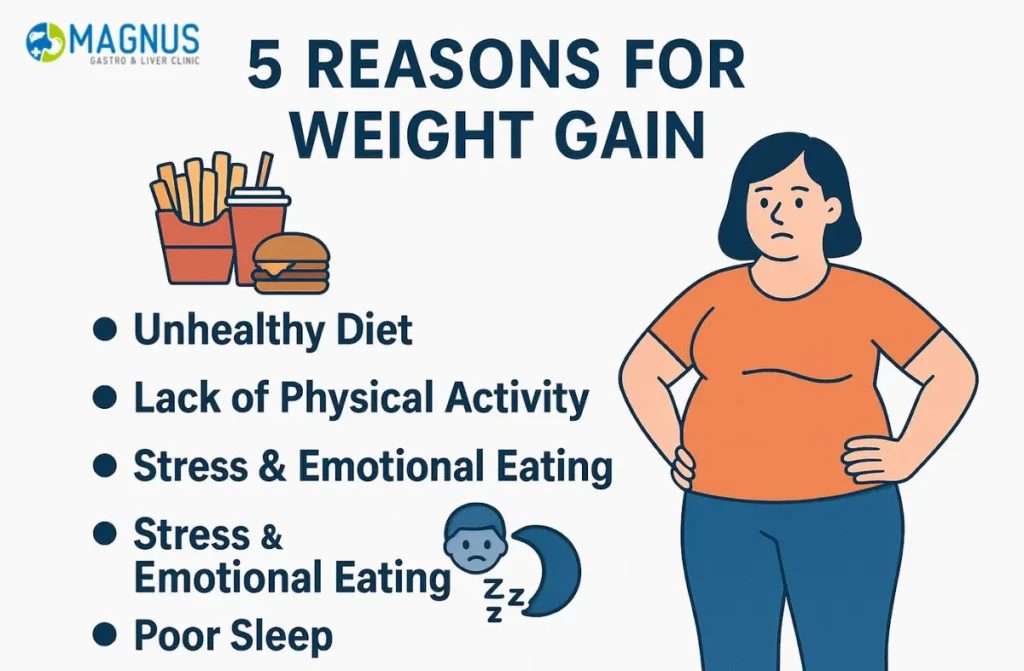Weight gain is the gradual or sudden increase in body mass caused by excess fat, muscle, or even fluid retention. While it may seem like a simple imbalance between calories consumed and burned, the causes of weight gain are far more complex. Lifestyle habits, hormonal changes, emotional well-being, and underlying health conditions all play a role. Understanding why weight creeps up is the first step toward managing it effectively and protecting long-term health.
Signs and Effects of Being Overweight
Being overweight affects more than just appearance; it can influence overall health and daily functioning. Recognizing the weight gain symptoms and side effects of obesity early can help prevent serious complications. Here are the 5 warning signs your weight is affecting your health:
- Persistent fatigue and low energy levels: Excess weight can make simple activities exhausting. Carrying extra pounds strains the heart and muscles, causing chronic tiredness and reduced stamina, signaling that your body is under undue stress.
- Breathing difficulties and sleep issues: Overweight individuals often experience shortness of breath and disrupted sleep patterns, including sleep apnea. These are key signs and symptoms of obesity that can significantly impact quality of life.
- Joint and back pain: Extra weight places additional pressure on bones, joints, and ligaments, leading to chronic pain, stiffness, and reduced mobility. Recognizing these weight gain symptoms early can prevent long-term musculoskeletal problems.
- Frequent digestive problems and acid reflux: Overweight individuals are more prone to gastrointestinal discomfort, including bloating and heartburn. Persistent issues may indicate that weight is negatively affecting digestive health.
- Changes in blood pressure, cholesterol, and blood sugar levels: Being overweight increases the risk of developing hypertension, high cholesterol, and insulin resistance. These are the important 5 warning signs your weight is affecting your health that highlight the systemic impact of obesity.
This section emphasizes that weight gain is not merely cosmetic but can have profound health implications.
10 Habits that Cause Weight Gain
Understanding the causes of weight gain requires looking beyond the scale and examining daily routines. Many seemingly harmless habits can gradually lead to unwanted pounds. Here are 10 major contributors:
- Sedentary behavior: Spending long hours sitting at work, watching TV, or scrolling on devices reduces calorie expenditure. This lack of movement slows metabolism and encourages fat accumulation, which is a common reason for weight gain.
- Frequent consumption of processed foods: Packaged snacks, fast food, and ready-to-eat meals are often high in sugars, unhealthy fats, and empty calories. Regular intake of these foods is a leading cause of weight gain in females and men alike.
- Skipping breakfast: Skipping the first meal of the day can trigger overeating later, as hunger signals intensify. This habit disrupts metabolism and contributes to sudden weight gain female patterns.
- Inadequate water intake: Staying hydrated is crucial for efficient metabolism and appetite control. Insufficient water can cause the body to retain fluids and feel hungry even when calorie intake is adequate, increasing the causes of weight gain in men.
- Eating while watching screens: Distracted eating often leads to consuming larger portions and mindless snacking. Over time, this contributes to one of the subtle reasons for weight gain that many overlook.
- Lack of sleep: Poor sleep affects hormones that regulate hunger and satiety, increasing cravings for high-calorie foods. Chronic sleep deprivation is a hidden cause of weight gain that can accelerate fat accumulation.
- Poorly managed stress: Stress triggers the release of cortisol, a hormone that promotes fat storage, especially around the abdomen. Uncontrolled stress is another common reason for weight gain in both men and women.
- Regular consumption of sugary drinks: Beverages like soda, sweetened teas, and energy drinks add calories without satiety. Habitual intake is a frequent contributor to causes of weight gain across all age groups.
- Frequent alcohol consumption: Alcohol contains empty calories and can impair judgment, leading to overeating. It is a well-known reason for weight gain, particularly when combined with social snacking.
- Lack of exercise: Infrequent physical activity slows calorie burn and reduces muscle mass, which is crucial for metabolism. This straightforward lifestyle factor remains one of the most preventable causes of weight gain in females and males.
These habits, when combined, can make weight gain seem inevitable, but awareness is the first step toward change.

Preventing and Managing Overweight
Preventing and managing weight gain involves understanding the causes of weight gain and taking proactive steps to balance lifestyle, diet, and health. Here are effective strategies:
- Adopt a balanced diet: Focus on nutrient-rich foods like vegetables, fruits, lean proteins, and whole grains. Limiting processed foods and sugars addresses the reasons for weight gain and supports sustainable weight management.
- Establish regular physical activity: Incorporate both cardio and strength training exercises into your routine. Exercise not only burns calories but also boosts metabolism, countering one of the main causes of weight gain in females.
- Prioritize sleep: Consistent, quality sleep helps regulate hunger hormones and supports overall metabolism. Poor sleep is a hidden trigger for weight gain that is often overlooked.
- Manage stress effectively: Techniques like meditation, yoga, or deep breathing exercises can lower cortisol levels. Reducing stress is essential to prevent emotional eating, a common reason for weight gain.
- Monitor eating habits: Mindful eating, portion control, and avoiding distractions while eating can prevent overeating. Paying attention to hunger cues reduces the impact of causes of weight gain linked to lifestyle habits.
- Seek medical guidance when necessary: Hormonal imbalances or underlying medical conditions can contribute to weight gain. Consulting a healthcare professional ensures proper evaluation and intervention for persistent weight issues.
These strategies emphasize that managing weight is a combination of lifestyle changes, mindful habits, and awareness of health factors.
Why Does Weight Gain Matter?
Weight gain is more than a cosmetic concern; it significantly impacts overall health. Recognizing its importance can motivate timely action. Here’s why it matters:
- Increased risk of chronic diseases: Excess weight is closely linked to conditions like diabetes, heart disease, and high blood pressure. Understanding the causes of weight gain in men helps identify preventive measures to reduce long-term health risks.
- Joint and musculoskeletal strain: Carrying extra weight puts pressure on bones, joints, and ligaments, leading to chronic pain and mobility issues. These are some of the major side effects of obesity that can limit daily activities.
- Hormonal imbalances: Weight gain can disrupt normal hormonal function, affecting metabolism, reproductive health, and mood. This underscores the importance of addressing the underlying causes of weight gain in men early.
- Impact on mental health: Overweight individuals may face reduced self-esteem, social anxiety, or depression. The psychological side effects of obesity highlight the interconnectedness of mental and physical well-being.
- Sleep disturbances: Excess weight increases the risk of sleep apnea and other sleep disorders, which can further exacerbate weight issues. Recognizing these complications emphasizes why maintaining a healthy weight is crucial.
Weight gain matters because it influences multiple aspects of life, from physical health to emotional well-being.
What Can Be Done About Weight Gain?
Addressing weight gain requires a combination of lifestyle changes, awareness, and consistent effort. Understanding causes of weight gain can help in implementing effective solutions:
- Adopt a structured eating routine: Eat balanced meals at regular intervals to prevent overeating and stabilize metabolism. This approach can counter sudden weight gain female patterns and reduce weight gain symptoms.
- Increase physical activity: Incorporate daily exercise, including cardio, strength training, and flexibility exercises. This not only burns calories but also combats signs and symptoms of obesity, improving overall health.
- Monitor portion sizes and food choices: Being mindful of what and how much you eat can prevent excess calorie intake. Focus on whole foods and limit processed items to address one of the main causes of weight gain.
- Stay hydrated: Drinking adequate water aids digestion, metabolism, and appetite control. Proper hydration reduces the likelihood of overeating, a common trigger of weight gain symptoms.
- Manage stress and prioritize sleep: Techniques like meditation, yoga, or relaxation exercises help regulate cortisol and reduce emotional eating. Ensuring sufficient sleep prevents hormonal disruptions that contribute to sudden weight gain female and other signs and symptoms of obesity.
Implementing these strategies consistently can help manage weight effectively while promoting overall well-being.
Gut Health and Weight Gain
Gut health plays a crucial role in maintaining a healthy weight, as the balance of gut bacteria affects digestion, metabolism, and fat storage. Disruptions in gut flora can contribute to causes of weight gain and make weight management more difficult. Here’s how:
- Imbalanced gut microbiome: Poor gut bacteria can impair digestion and nutrient absorption, leading to increased fat storage and inflammation. This imbalance is a hidden reason for weight gain that many overlook.
- Impact on metabolism: A healthy gut regulates hormones that control appetite and energy use. Disrupted gut health can slow metabolism, contributing to gradual weight accumulation, which is one of the subtle causes of weight gain.
- Increased cravings and appetite: Certain gut bacteria influence cravings for sugary and high-fat foods. These cravings drive overconsumption, explaining another reason for weight gain in both men and women.
- Digestive issues and bloating: Gut imbalances often cause bloating, gas, and constipation. These symptoms may mask underlying causes of weight gain, making it challenging to maintain a healthy body weight.
- Immune and inflammatory responses: A compromised gut can trigger systemic inflammation, which interferes with fat metabolism and encourages weight gain. Supporting gut health is therefore essential in addressing underlying reasons for weight gain.
Maintaining a balanced gut through diet, probiotics, and lifestyle choices is a key step in preventing and managing excess weight.
What You Should Do
Taking proactive steps can prevent further weight gain and support overall health. Addressing the causes of weight gain early helps maintain balance in both body and mind. Here are practical actions:
- Adopt mindful eating habits: Pay attention to hunger cues, eat slowly, and avoid distractions during meals. This practice reduces overeating and tackles one of the main reasons for weight gain.
- Regular physical activity: Aim for a mix of cardio, strength training, and flexibility exercises. Consistent movement not only burns calories but also improves metabolism, countering multiple causes of weight gain.
- Prioritize sleep and stress management: Adequate sleep and stress control stabilize hormones like cortisol and ghrelin, which influence appetite and fat storage. This approach helps prevent reasons for weight gain linked to lifestyle factors.
- Hydration and balanced diet: Drinking enough water and focusing on nutrient-rich foods supports digestion, reduces cravings, and minimizes causes of weight gain associated with poor dietary habits.
- Medical evaluation if necessary: If weight gain is sudden or unexplained, consult a healthcare professional to rule out hormonal imbalances or underlying conditions. Addressing medical factors is essential to prevent long-term complications.
Consistently applying these strategies creates a sustainable path to maintaining a healthy weight and overall well-being.
Conclusion
Weight gain is influenced by multiple factors, from lifestyle habits to medical conditions. Understanding the causes of weight gain empowers individuals to make informed choices that protect both physical and mental health. By adopting balanced eating, regular exercise, stress management, and mindful habits, weight can be effectively controlled. Taking proactive steps now ensures long-term well-being and reduces the risk of serious health complications. Start making these changes and prioritize a healthier, more energetic life.
Read also How To Detox Your Liver Naturally.




